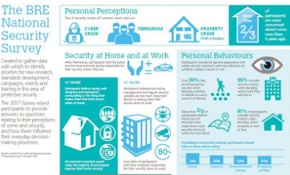BRE National Security Survey
In December 2017, the BRE National Security Survey revealed that personal security is becoming an increasing worry across the UK, with 2 out of 3 respondents more concerned about crime today than they were 5 years ago. The top three issues raised as causing the most concern were cyber crime, terrorism and property crime.
Developed by the creators of SABRE, BRE’s security assessment and certification scheme for new and existing buildings and built infrastructure assets, the survey was initiated to help understand how people’s perceptions influence their everyday decision-making in relation to their home life, work-life and travel arrangements.
Property crime:
Whilst property crime was ranked as the highest security concern, with 43.17% of participants ranking it as a major concern, the vast majority of respondents (87%) felt their homes were either secure or very secure.
One of the key factors identified by the National Security Survey in making respondents feel safe and secure at home was well-designed and maintained areas immediately adjacent to their properties. In 2015, security was introduced into building regulations guidance for the first time in the form of a new Approved Document. Approved Document Q ‘Security – Dwellings’ introduces requirements for windows and doors on all dwellings constructed in England. 63% of respondents identified such features as the second most important factor in making them feel secure in their home.
The survey also highlighted the importance of crime and security in influencing the purchasing decisions of home buyers and tenants, with half of respondents stating security was a major influence on their choice of property and a further third believing it would have a minor influence on their decision to purchase or rent.
Cyber crime:
In 2016 there were 38% more cyber security incidents than the previous year, whilst 2017 has already seen a number of high-profile incidents, including a direct email hack on the Houses of Parliament and the denial-of-service attack on Lloyds, Halifax and Bank of Scotland, which ran for two days in January. The incident came just months after a serious cyber-heist against Tesco Bank, when £2.5m was lost from 9,000 accounts.
Following the increase in tempo of notable cyber attacks, it is of little surprise to see 1/4 of respondents place cyber crime as their highest concern. Despite this, 1 in 5 placed it as their lowest concern which could mean these individuals are either content with existing security controls or are perhaps agnostic to the potential threats posed. Either way, it is clear that there is a lot more to be done in relation to the threat posed by cyber criminals, with the global cost of online attacks estimated to reach $2 trillion by 2019, a threefold increase from the 2015 estimate of $500 billion .
Terrorism:
In a year when UK terror arrests rose 68% to record levels, coupled with a string of large-scale attacks across the UK and Europe, terrorism has been a regular feature of daily news broadcasts and social media feeds. This notoriety has undoubtedly led to increased concern around the issue, with 2/3 of respondents to the survey stating that recent acts of terrorism have led them to become more security-conscious when out and about.
When asked whether recent terrorist attacks across Europe had influenced their travel decisions within the United Kingdom, one in two respondents said they had. This demonstrates the remarkable societal reach of terrorism, its ability to create fear far beyond the individuals directly involved in an incident.
The economic impact in sectors such as tourism can be significant. In the aftermath of the 2015 Paris attacks, the number of tourists entering France fell 8% and it is estimated that tourism revenues in Paris alone were reduced by €1.5bn.
BRE’s National Security Survey asked respondents whether their choice of hotel would be influenced by security, with 1 in 5 respondents stating it would be a major influence when selecting where to stay. Similar results were seen when respondents were asked about attendance at major events and concerts. Clearly, terrorism is influencing behaviours and making the general public more security conscious when they are planning to be away from home.
When respondents were asked whether they would make use of a security rating scheme for different types of facilities (similar to that used by the Food Standards Agency for food hygiene), 70% said they would be influenced by a scheme adopted by hotels and 60% in the case of airports and entertainment venues. Other notable facility types for which a security rating scheme would be welcomed included retail malls, transport premises and entertainment venues. Clearly there is a desire amongst the general public, particularly when using crowded places, for greater assurance that these places are safe and secure.
In terms of security in the workplace, over 80% of respondents felt either secure or very secure at their place of work. The vast majority of respondents stated that they hold their employers responsible for their safety whilst at work (83%), with nearly 3/4 recognising their own role in workplace security.
When asked what types of security measures would make them feel more secure at work, at the top of the list was a desire to see proactive management and regular security updates to employees (over 58%). Security rated windows/doors and CCTV installations came 2nd and 3rd place respectively, highlighting that investment in management and the creation of a security culture in the workplace may have just as significant an impact in creating an environment where staff feel safe and secure, as capital intensive crime prevention and security interventions.
Gavin Jones, Director of SABRE, commented:
“Although we are continuing to identify effective ways to protect our built environment from crime and terrorism, these efforts are not necessarily reflected in the general public’s perceptions of their own personal security. Despite the likelihood of an individual being directly affected by a terrorist incident being extremely remote, recent events are having a disproportionate impact on people’s lives; they appear to be influencing where people are willing to travel, where they stay and whether they attend a major event or concert. The public clearly need reassurance that the places they live, work and visit are safe and secure. It is in the interests of businesses that they find innovative solutions to this problem.”
To download a copy of BRE’s 2017 National Security Survey, see here.
This article was originally published here by BRE in December 2017.
[edit] Find out more
[edit] Related articles on Designing Buildings Wiki
- BRE articles on Designing Buildings Wiki.
- Embedded security: Procuring an effective facility protective security system.
- Infrastructure and cyber attacks.
- SABRE.
- Secure space.
- Security and the built environment.
- Smart surveillance, video surveillance and VSaaS.
- The role of planning in delivering a safe and secure built environment.
Featured articles and news
A case study and a warning to would-be developers
Creating four dwellings for people to come home to... after half a century of doing this job, why, oh why, is it so difficult?
Reform of the fire engineering profession
Fire Engineers Advisory Panel: Authoritative Statement, reactions and next steps.
Restoration and renewal of the Palace of Westminster
A complex project of cultural significance from full decant to EMI, opportunities and a potential a way forward.
Apprenticeships and the responsibility we share
Perspectives from the CIOB President as National Apprentice Week comes to a close.
The first line of defence against rain, wind and snow.
Building Safety recap January, 2026
What we missed at the end of last year, and at the start of this...
National Apprenticeship Week 2026, 9-15 Feb
Shining a light on the positive impacts for businesses, their apprentices and the wider economy alike.
Applications and benefits of acoustic flooring
From commercial to retail.
From solid to sprung and ribbed to raised.
Strengthening industry collaboration in Hong Kong
Hong Kong Institute of Construction and The Chartered Institute of Building sign Memorandum of Understanding.
A detailed description from the experts at Cornish Lime.
IHBC planning for growth with corporate plan development
Grow with the Institute by volunteering and CP25 consultation.
Connecting ambition and action for designers and specifiers.
Electrical skills gap deepens as apprenticeship starts fall despite surging demand says ECA.
Built environment bodies deepen joint action on EDI
B.E.Inclusive initiative agree next phase of joint equity, diversity and inclusion (EDI) action plan.
Recognising culture as key to sustainable economic growth
Creative UK Provocation paper: Culture as Growth Infrastructure.
Futurebuild and UK Construction Week London Unite
Creating the UK’s Built Environment Super Event and over 25 other key partnerships.
Welsh and Scottish 2026 elections
Manifestos for the built environment for upcoming same May day elections.
Advancing BIM education with a competency framework
“We don’t need people who can just draw in 3D. We need people who can think in data.”


























